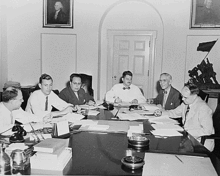Leon Keyserling
Leon Keyserling | |
|---|---|
 Keyserling (third from left), 1949 | |
| 2nd Chair of the Council of Economic Advisers | |
| In office November 2, 1949 – January 20, 1953 Acting: November 2, 1949 – May 10, 1950 | |
| President | Harry S. Truman |
| Preceded by | Edwin Griswold Nourse |
| Succeeded by | Arthur F. Burns |
| Personal details | |
| Born | January 11, 1908 Charleston, South Carolina, U.S. |
| Died | August 9, 1987 (aged 79) Washington, D.C., U.S. |
| Political party | Democratic |
| Spouse | Mary Dublin |
| Education | Columbia University (BA) Harvard University (JD) |
Leon Hirsch Keyserling (January 11, 1908 – August 9, 1987)[1] was an American economist and lawyer who served as chairman of the Council of Economic Advisers from 1950 to 1953. During his tenure, he advised President Harry S. Truman on the economic issues and helped draft major pieces of Fair Deal legislation.
Early life
Keyserling was born in 1908 in Charleston, South Carolina and grew up on Saint Helena Island.[2] He earned an A.B. from Columbia University in 1928 and a Juris Doctor degree from Harvard Law School in 1931. He returned to Columbia as a graduate student in the Department of Economics from 1931 to 1933,[1] where he also taught for a short time.[3] While there, Keyserling studied under Rexford Tugwell, but never finished his dissertation.[4]
Keyserling married Mary Dublin Keyserling, also an economist.[1]
Government career
In 1933 Keyserling became an attorney for the newly constituted Agricultural Adjustment Administration,[1] a New Deal agency that distributed subsidies to reduce crop area. From 1933 to 1946 he was a consultant economist to the Senate on a variety of social, economic, industrial, and financial issues, during which time he also served as a legislative assistant to Democratic New York Senator Robert F. Wagner (1933–37) and held several positions, including general counsel, in the US Housing Authority (later, the Federal Public Housing Authority in the National Housing Agency) (1937–46).[1] It was during his time with Wagner that Keyserling was participating in drafting various New Deal initiatives, including the National Industrial Recovery Act, the Social Security Act, and the National Labor Relations Act.[5]
In 1946 Keyserling became the Vice Chairman of the newly created Council of Economic Advisers. He became its Acting Chairman in 1949 and the Chairman in 1950. In 1952 Keyserling and his wife were attacked by Joseph McCarthy as part of the Second Red Scare as "belonging to Communist front groups."[6] Keyserling left as Chairman in 1953.[1]
During his time at the CEA, Keyserling strongly promoted the pursuit of sustained economic growth and full employment.[7] He also introduced the reporting of the Gross National Product in real as well as nominal dollars [8]
Later life
Following his time advising President Truman, Keyserling consulted with Congress on a variety of economic issues and also practiced law.[1] In 1954 he founded the Conference on Economic Progress (CEP), serving as its president until 1987.[1] His wife had left the Department of Commerce in 1953 and joined him in consulting as well as the founding of the CEP, where she served as associate director from its inception to 1963.[9]
In 1969 Keyserling served as president of the National Committee for Labor in Israel,[1] a US organization that worked with the Israeli Histadrut.
He died on August 9, 1987, at Washington, D.C.'s George Washington University Hospital.[5]
Writings
Based on Leon H. Keyserling Papers in the Harry S. Truman Presidential Library and Museum.[1]
- Redirecting Education (with Rexford Tugwell) (1934)
- Toward Full Employment and Full Production (1954)
- Consumption-Key to Full Prosperity (1957)
- The Federal Budget and the General Welfare (1959)
- The Peace by Investment Corporation (with Benjamin Javitts) (1962)
- Taxes and the Public Interest (1963)
- Progress or Poverty (1964)
- The Move Toward Railroad Mergers (1965)
- A Freedom Budget for All Americans (1966)
- The Scarcity School of Economics (1973)
- Liberal and Conservative National Economic Policies and Their Consequences, 1919-79 (1979)
- The Current Significance of the New Deal (1984)
References
- ^ a b c d e f g h i j "Leon H. Keyserling Papers". Harry S. Truman Library and Museum. Retrieved 2009-01-11.
- ^ South Carolina Encyclopaedia: Keyserling, Leon Hirsch Retrieved 2018-06-17.
- ^ Virgo, John M. (September 1987). "Articles In Memoriam: Leon H. Keyserling 1908–1987". Atlantic Economic Journal. 15 (3): 1. doi:10.1007/BF02316880. ISSN 1573-9678. S2CID 189874376.
- ^ Brazelton, W. Robert (Fall 1997). "Retrospectives: The Economics of Leon Hirsch Keyserling". Journal of Economic Perspectives. 11 (4): 189–197. doi:10.1257/jep.11.4.189.
- ^ a b Wayne, Leslie (1987-08-11). "Leon Keyserling, Economic Aide to Truman, Dies". The New York Times.
- ^ Storrs, Landon R. Y. (2003-09-01). "Red Scare Politics and the Suppression of Popular Front Feminism: The Loyalty Investigation of Mary Dublin Keyserling". Journal of American History. 90 (2): 491–524. doi:10.2307/3659442. ISSN 0021-8723. JSTOR 3659442.
- ^ Collins, Robert M. (2002-04-04). More: The Politics of Economic Growth in Postwar America. Oxford University Press. ISBN 9780195348484.
- ^ Collins, Robert M. (2002-04-04). More: The Politics of Economic Growth in Postwar America. Oxford University Press. p. 36. ISBN 9780195348484.
- ^ "Keyserling, Mary (Dublin) Papers, 1924-1988: A Finding Aid". Harvard University Library. Retrieved 2009-01-11.
Further reading
- Brazelton, W. Robert (2001). Designing U.S. Economic Policy: An Analytical Biography of Leon H. Keyserling. New York: Palgrave. ISBN 978-0-333-77575-2.
External links
- Leon Keyserling Papers at Georgetown University
- Leon H. Keyserling Papers at the Truman Library
- Leon Keyserling at Find a Grave

